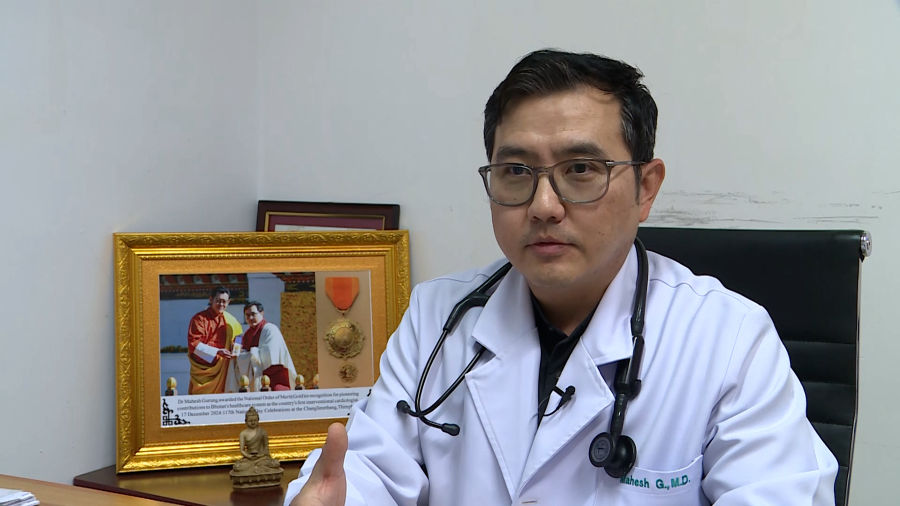
A simple sore throat, often considered a minor illness, is quietly becoming a major public health threat in Bhutan. According to the interventional cardiologist at the national referral hospital, if the throat infection is caused by a particular bacterium called Group A Streptococcus, it can lead to rheumatic heart disease, a chronic and potentially fatal condition that damages the heart.
According to the cardiologist, the disease develops when the immune system, after fighting repeated throat infections caused by that bacteria, mistakenly starts attacking the heart valves.
Doctors say this immune misfire causes valve inflammation, narrowing, or leakage, eventually resulting in serious complications such as heart failure, stroke, or the need for open-heart surgery.
What is alarming is that rheumatic heart disease progresses silently and by the time symptoms appear, the damage is often irreversible.
A recent study at the national referral hospital diagnosed 200 patients with rheumatic heart disease over a one-year period.
Of these, around 30 were newly diagnosed cases, and the majority of them had already developed serious complications by the time they were diagnosed.
Dr Mahesh Gurung, an interventional cardiologist at the Heart Centre said “70 per cent of those patients have come not with early rheumatic heart disease, they have come with complications such as stroke, artery fibrillation, or already heart failure, or they need a surgery. So, had this been detected early, these complications would not have occurred.”
He added that children are particularly vulnerable, with infections often beginning in school years, and repeated exposure to the bacteria in overcrowded classrooms or among peers increases their risk.
As rheumatic heart disease takes years to develop, complications typically appear in early adulthood, suggesting that infections begin much earlier in life.
To help families recognise the warning signs, the doctor highlighted the symptoms of a bacterial sore throat that may lead to rheumatic fever if left untreated.
Dr Mahesh Gurung said “Very high grade fever above 38 degrees, and you have severe sore throat, and you look into your mouth, you see your tonsils are all enlarged and they have pus on them, which is called exudative tonsillitis, and you may not have cough. You also have lymph nodes in your neck that are enlarged.”
But early diagnosis remains a challenge. Currently, only three regional hospitals are equipped with trained echocardiography technicians who can confirm the disease.
To strengthen frontline capacity, 30 General Duty Medical Officers from across the country attended a workshop recently.
The training was aimed at equipping them with the skills needed for early detection of rheumatic heart disease and reducing the number of patients presenting with late-stage complications.
Dr Tshering Phuntsho, GDMO of Tsimalakha Hospital in Chhukha said “We can act more efficiently now and find the cause from root. We can go back to our district and provide awareness to parents, teachers, and community. During annual health screenings, we can also educate young children about it.”
Likewise, GDMO of Gasa Hospital Dr Deki Wangmo said “When people get chest pain, they usually are at home conducting rituals and those usual things we Bhutanese do when we are sick. This causes a significant delay in presentation in hospital.”
Dr Tshering Choden, GDMO of Jigme Dorji Wangchuck Military Hospital in Dewathang, Samdrup Jongkhar said “Although Dewathang is a cluster hospital, we do not have 2-D echo facilities. So, we refer patients who have features such as rheumatic heart disease to tertiary care centres for 2-D echo.”
As the healthcare system takes important strides toward curbing the silent threat of rheumatic heart disease, early detection and timely treatment could transform the futures of thousands of children, preventing a lifetime of heart complications caused by a simple sore throat.
Namgay Dema








